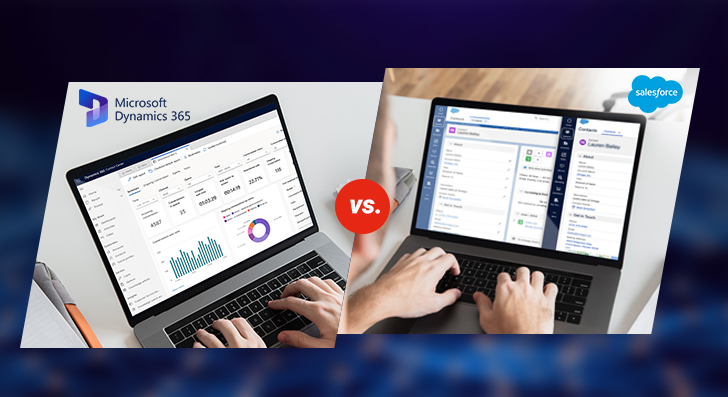Businesses require high-performing CRM solutions to track, generate, and nurture leads. CRM systems help companies track all interactions across the entire customer lifecycle, streamlining processes, and creating revenue-generation opportunities. When we talk about industry-leading CRM solutions, two names clearly stand out: Microsoft Dynamics 365 and Salesforce.
A part of the broader Microsoft ecosystem, Microsoft Dynamics 365 is a comprehensive suite of cloud-based applications that help run business operations efficiently. Launched around a decade back, Dynamics 365 integrates effortlessly with all other Microsoft products, ensuring ease of use and high productivity.
In contrast, Salesforce has been around since 1999. Since it was one of the first companies to deliver a CRM SaaS product, it emerged as a market leader soon. Over the last three decades, Salesforce has expanded its offerings to provide separate applications for sales, marketing, and customer service, and today, it is the world’s leading CRM.
Both Microsoft Dynamics 365 and Salesforce provide powerful tools for managing different facets of a business. However, they differ on many fronts, including features, integration capabilities, and customizability.
For a user who wants to know which CRM is better for their needs, there is no simple answer. The platform they should select will depend on the unique requirements of their business. In this piece, we have presented a head-to-head comparison of Microsoft Dynamics 365 and Salesforce to help you understand which CRM to choose and when.

Microsoft Dynamics 365 and Salesforce: A Comprehensive Comparison
1. Deployment
One key area where the two platforms differ considerably is deployment. Salesforce has always been offered as a SaaS solution. It runs and stores data in the cloud. So, this feature is a plus for those who are fine with their data and applications being hosted on a remote server and don’t need an on-premises solution.
On the other hand, Microsoft Dynamics 365 comes with a lot more flexibility as it offers both on-premises and cloud solutions. Some of its applications like Sales and Service only have cloud-based versions. Other applications in its ecosystem such as Finance and Supply Chain Management have both on-premises and cloud-based editions.
So, when it comes to deployment, Dynamics clearly gets an edge- it offers more options.
2. Integration
When comparing Dynamics 365 vs Salesforce, Dynamics 365 provides native integration capabilities with all Microsoft products. If your organization relies on Office 365, Outlook, or SharePoint, the platform will work seamlessly with them. Ease of integration simplifies work, particularly for teams familiar with Microsoft’s interface.
Salesforce does connect with many Microsoft products. That being said, users may not enjoy the advantages they have in native integration. Salesforce, however, has its own robust ecosystem comprising 2600+ apps- AppExchange. Salesforce also comes with connected platforms where developers build tailored solutions for Salesforce.
So, if your business depends heavily on the Microsoft product suite, Dynamics 365 is a great option. But if you are simply looking for integration with a wide range of applications, Salesforce may be a better choice.
Need a Tailor-Made CRM Solution for Your Teams?
3. Features
Both platforms come with sophisticated features for managing contacts, leads, and accounts. These features let you save and track data related to customers and prospects and streamline sales processes.
Both platforms also have distinct modules for handling sales, marketing, and customer service. Salesforce has Sales Cloud, Marketing Cloud, and Service Cloud, whereas 365 has Dynamics Sales, Dynamics Customer Insights, and Dynamics Customer Service.
In addition, Dynamics 365 has a powerful module for managing field operations (Field Service). Though Salesforce comes with a similar module, Salesforce Field Service (previously known as Field Service Lightning or FSL), it’s not as well-established as Microsoft’s offering. Where Salesforce clearly has the lead are marketing and customer service. Both these modules have been operational for a long time and are widely adopted across organizations.
4. User Experience
A CRM with an easy-to-use, intuitive interface helps all users access relevant information for decision-making.
Microsoft Dynamics 365 comes with a navigation menu on the left through which users are able to instantly find customer accounts, leads, contacts, and opportunities. They can search for these items using a search bar at the top. They can also create a work list that displays tasks to be completed.
Salesforce has a navigation bar at the top to enable users to find leads, accounts, contacts, and opportunities easily. From this menu, users can dive deep dive into any record they want, making it a user-friendly interface.
Both platforms come with a contemporary look and feel and are intuitive to use. There’s hardly any learning curve involved. Dynamics 365 has a slight edge here as its interface is similar to most Microsoft products that are widely used across organizations.
5. AI Capabilities
When comparing Dynamics 365 vs Salesforce, both provide noteworthy artificial intelligence capabilities. In addition to their existing AI tools, Microsoft and Salesforce both have enterprise-grade resources to build custom AI tools to make their CRM platforms more intelligent.
Dynamics 365 users have the option to utilize Copilot to automate tasks and generate new ideas and insights. In Dynamics 365 Sales, AI helps teams update customer records, create meeting summaries, and pull required data from Outlook or SharePoint. In Dynamics 365 Customer Insights, AI helps create customer segments for precise targeting and generate content for marketing campaigns through natural language prompts. In Dynamics 365 Customer Service, AI provides contextual answers to customer queries in email and chat.
Salesforce, on the other hand, comes with an integrated set of AI technologies- Einstein- that performs a broad range of tasks. Einstein helps set up workflows to automate common tasks such as invoice processing or form filling. It also enables users to create custom responses for customers and employees.
Additionally, Einstein uses machine learning algorithms to reveal hidden patterns and trends in data. It also analyzes customer behavior and provides recommendations on the most optimal strategies. This helps teams realize the desired outcomes.
Though Einstein works seamlessly with Salesforce, users require additional licensing to access its advanced features. In contrast, all the features of Copilot are covered within the standard Dynamics package.
6. Customization and Extendibility
Business teams increasingly look for software solutions that can be customized as per their requirements. Microsoft Dynamics 365 offers the room to tailor the CRM platform to meet an organization’s specific needs. Users have the option to customize views or add, modify, and delete records, fields, and forms- all using built-in tools. No need for extensive coding. Additionally, users may add further customizations using the Power Platform suite. For instance, automated workflows may be created using Power Automate.
Salesforce is also well-known for its customization capabilities. Users are free to modify workflows, fields, and objects based on their needs. Those who are well-versed with Apex, Salesforce’s programming language, or Lightning Web Component framework have the option to develop advanced customizations or custom pages and functions in the CRM.
As far as scalability is concerned, Dynamics 365 offers a range of hosting options within each of its applications, allowing users to extend the CRM as their needs evolve. Salesforce also comes with a tiered pricing structure and an exhaustive set of features. These accommodate the growing requirements of any business.
7. Pricing
Microsoft Dynamics 365 has a flexible pricing model. Different modules have been priced differently. Within each module, there are a range of plans to choose from. For example, the starter plan for Dynamics 365 Sales costs $65/user/month while its top-tier plan costs around $150/user/month. For Dynamics 365 Customer Service, the starter plan costs $50/user/month while the top-end plan costs $195/user/month. If they want, users may add features to their existing plans, but this will raise the overall cost.
In contrast, Salesforce follows a tiered pricing model where different editions are available to meet varying user needs. For example, the Salesforce Sales Cloud offers the following editions:
- Enterprise: $165/user/month
- Unlimited: 330/user/month
- Einstein1 Sales: 500/user/month
In each edition, add-ons may incur additional expenses.
For small businesses, Dynamics 365 may be a more economical option due to its overall lower pricing. On the other hand, in organizations with little budgetary constraints, Salesforce’s solutions may provide better value for money on account of their extensive feature set that caters to the complex needs of medium and large-sized businesses.
Microsoft Dynamics CRM and Salesforce: The Final Verdict
Both Microsoft Dynamics and Salesforce are innovative business solutions with robust integration features, AI capabilities, and user-friendly interfaces. When evaluating Dynamics 365 vs Salesforce, businesses should choose the platform that best suits their objectives, customization needs, and budget. The following factors should be taken into account:
-
- Existing Tech Infrastructure: If your organization has invested heavily in the Microsoft ecosystem, Dynamics 365 could be the preferred option.
- Choice of Deployment: Microsoft Dynamics 365 offers cloud-based as well as on-premises deployment whereas Salesforce is only cloud-based. Choose a CRM solution based on your deployment requirements.
- Budgetary Constraints: Microsoft Dynamics offers better value for money as your business requirements grow and you add more features. See which CRM fits within your budget and long-term plans.
- Features: Salesforce offers feature-rich modules for marketing and customer service. In contrast, Microsoft Dynamics 365 has a robust module for field service. Users may choose one or the other based on which aspects of their business they want to focus on.
Also, purchasing an industry-leading CRM alone will not grow your business. The CRM solution should be aligned with your requirements, and this has to be done by a trusted expert. With a wealth of expertise in deploying CRM solutions, Damco supports you through all aspects of your CRM journey, ensuring a strong ROI on your tech investments.





